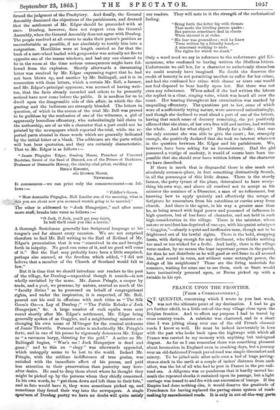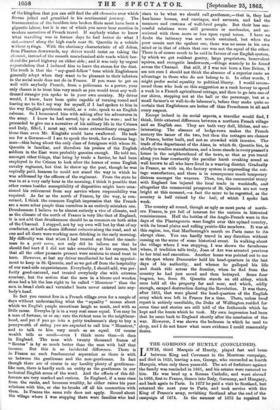S T. QUENTIN, concerning which I wrote to you last week,
was not the ultimate point of thy destination. I had to go yet further afield, to a little out-of-the-way village close upon the Belgian frontier. And to effect my purpose I had to travel by cross country roads. A cabriolet was chartered, and in a short time I was jolting along over one of the old French chaussle roads I know so well. He must be indeed inveterately in love with the past who looks back upon the highways with which all France was carried to my memory with anything but unfeigned disgust. As far as I can remember there was something pleasant about locomotion in England even in coaching days, but a journey over an old-fashioned French paved road was simple discomfort and misery. To be jolted mile after mile over a bed of huge paving- stones stuck in the earth at a couple of inches' distance from each other, was the lot of all who had to post in France in the pre-rail- road era. A diligence was so ponderous that it hardly moved be- neath the repeated shocks it sustained upon its passage, but a light carriage was tossed to and fro with one succession of bumps. If the Empire had done nothing else, it would deserve the gratitude of Frenchmen for having replaced the paving-stone system of road- making by macadamized roads. It is only in out-of-the-way parts, of the kingdom that you can still find the old chaussees over which Sterne jolted and grumbled in his sentimental journey. The transmutation of the boulders into broken flints must have been a gigantic labour, but it is one of which you never hear mention in modern narratives of French travel. If anybody wishes to know what travelling was in former days he had better do what I (11(1,—travel along the high roads near St. Quentin in a vehicle without sj rings. With the obstinacy characteristic of all Jehus, from Phaeton downwards, my driver would insist on taking the chausse'e, instead of the smooth macadamized side roads which bor- threl the paved highway on either side ; and it was only by urgent espostulaticsa that I induced him to leave the stones for the dust. 'The truth is that the " my-good-fellow " tone which Englishmen generally adopt when they want to be pleasant to their inferiors in the social scale does not do in France. If you want to get on well with anybody French, from a policeman to a porter, your only chance is to treat him very much as you would treat any well- dressed stranger you spoke to in your own country. My driver would, I know, have been quite capable of turning round and leaving me to find my way for myself, if I had spoken to him in the way English gentlemen would, as a rule, speak to an English cabman. So I humoured him with asking after his adventures in the army. I knew he had served, by a modal he wore ; and he proceeded to give me a narrative of his military life in the Crimea and Italy, filled, I must say, with more extraordinary exaggera- tions than even Mr. Kinglake could have swallowed. Ile took me for a German—if I am to speak the truth, for a German bag- man—this being about the only class of foreigners with whom St. Quentin is familiar, and therefore his praises of the English soldiers in the East were probably genuine enough. He told me, amongst other things, that being by trade a farrier, he had been employed in the Crimea to look after the horses of some English cavalry regiment, but that he threw up the post, though he was capitally paid, because he could not stand the way in which be was addressed by the officers of the regiment. From the state he was in at a very early hour in the morning, I think it possible that other causes besides susceptibility of disposition might have occa- sioned his retirement from any service where responsibility was required. As far as the north of France, by the way, is con- cerned, I think the common English impression that the French are a more sober people than ourselves is an entirely mistaken one. Drunkenness I believe to be almost entirely a vice of climate, and as the climate of the north of France is very like that of England, it is not odd that drunkenness should be as common on both sides of the Channel. I stopped, not by my own will but by that of my conductor, at half-a-dozen different cabarets along the road, and at one and all there were working men drinking in the early morning. My difficulty was that when I had treated my friend the coach- man to a petit verre, not only did he inform me that he should feel hurt if I did not take something at his expense, but that all the other peasants present were anxious to stand treat in turn. However, at last my driver recollected he had an appoint- ment to keep in St. Quentin, and so we got off from the hospitality of our road-side acquaintances. Everybody, I should add, was per- fectly good-natured, and treated everybody else with extreme courtesy, but the notion that the men in a blouse and wooden shoes had a bit the less right to be called " Monsieur " than the men in broad cloth and varnishe I boots never entered into any- body's head.
In fact you cannot live in a French village even for a couple of days without understan,ding what the " equality " means about which we English people sometimes laugh so much, and with so little cause. Everybo ly is in a very real sense equal. You may be a man of fortune, or at an-r rate the richest man in the neighbour- hood, and yet if you go into a petty tradesman's shop to buy a pennyworth of string you are expected to call him "Monsieur," and to talk to him very much as an equal. Of course wealth tells as much—even I think more than—it does in England. The man with twenty thousand francs of "Rentes" is by so much better than the man with half that income. But this is an incidental difference. There is in France no such fundamental separation as there is with us between the gentleman and the non-gentleman. In fact though there are of course in my locality plenty of gentleman- like men, there is hardly such an entity as the gentleman in our technical English sense of the word. And the effects of this dif- ference are very marked and curious. In England, if a man rises from the ranks, and becomes wealthy, he either raises his poor relations with him, or else he breaks off all his connection with them. In France the same rule does not apply. Round about the village where I was stopping there were families who had risen to be what we should call gentlemen,—that is, they had handsome houses, and carriages, and servants, and had the manners and customs of well-bred people. But their less suc- cessful relations were still peasants or mechanics, and as- sociated with them more or less upon equal terms. I have no doubt the intimacy was not much sustained, but when the poor cousin met the opulent one, there was no sense in his own mind or in that of others that one was not the equal of the other. There is of course much to be said in favour of our English system, by which we get resident gentry, large proprietors, benevolent squires, and energetic landowners,—things scarcely to be found across the Channel. But still, if I was not born a free Briton, I am not sure I should not think the absence of a superior caste an advantage to those who do not belong to it. In other words, I might prefer social equality to political liberty. I would recom- mend those who look on this suggestion as a rank heresy to spend a week in a French agricultural cottage, and then to go into one of our shires, stopping not at the hall or the parsonage, but at a small farmer's or well-to-do labourer's, before they make quite so certain that Englishmen are better off than Frenchmen in all and every respect.
Except indeed in its social aspects, a traveller would find, I think, little external difference between a northern French village and an English one. They are both very dull, lifeless, and un- interesting. The absence of hedge rows makes the French scenery the tamer of the two, but then the cottages are cleaner in France, better built, and not so crowded with inmates. The trade of the department of the Aisne, in which St. Quentin lies, is chiefly in woollen manufactures, and a loom stands in every peasant's house in the neighbourhood of the town, so that as you travel along you hear constantly the peculiar harsh creaking sound so well known to all who have lived in a weaving district. Gradually in France, as with us, the factory system is superseding the cot- tage manufacture, and there is in consequence much temporary distress amongst the weavers. Then, too, the commercial treaty with England has injured the local trade in wooLstuffs, aria altogether the commercial prospects of St. Quentin are not very bright at this moment, —a fact the more to be regretted, as the country is half ruined by the hail, of which I spoke last week.
The country all round, though as ugly as most parts of north- ern France, is yet full of interest for the curious in historical reminiscences. Half the battles of the Anglo-French wars in the days of the Plantagenets were fought over this upland country, with its broad plains and rolling prairie-like meadows. It was at this region, too, that Marlborough's march on Paris came to its abrupt close. You can hardly travel in any direction without coming on the scene of some historical event. In walking about the village where I was stopping, I was shown the farmhouse where, if tradition tells truly, Joan of Arc was arrested previous to her trial and execution. Another house was pointed out to me as the spot where Dumourier held his head-quarters in the last days of his authority, and whence he galloped his life. and death ride across the frontier, when he fled from the country he had just saved and then betrayed. Some four leagues, too, from St. Quentin stands an old abbey, which once held all the property far and near, and which, oddly enough, escaped destruction during the Revolution. It was there,
after 1815, that were placed the head-quarters of the English army which was left in France for a time. There, unless local
report is entirely unreliable, the Duke of Wellington resided for
some time and stories are still told of the foxhounds which he kept and the hunts which he took. My own impression had beets
that he came back to England shortly after the conclusion of the war. However, I was shown the bedroom in which he used to sleep, and I do not know what more evidence I could reasonably desire.































 Previous page
Previous page